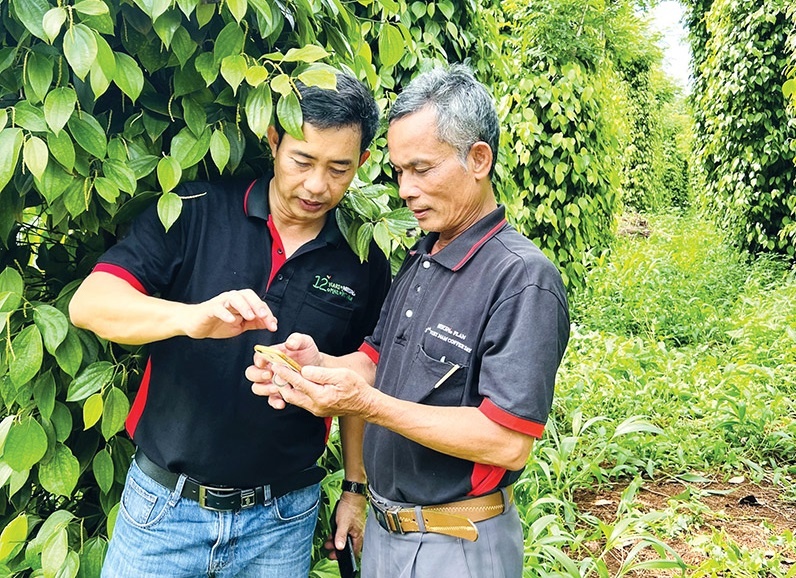Regeneration helping to attract investors
Of the about 200 farmers living in a hamlet in Ea Ktur commune in the Central Highlands province of Dak Lak, up to half have participated in the NESCAFÉ Plan project, an idea that Nestlé has implemented in Vietnam since 2010 with the goal to improve livelihoods in the coffee-growing area.
 |
| Farming households are more keen to lower the use of pesticides |
Hoang Van Son, leader of rural farmers in the hamlet, said that since using seedlings provided by Nestlé and cultivating according to techniques guided by the company’s experts, the output and quality of their coffee growing areas have all increased.
“One hectare of coffee previously gave only about 2-2.5 tonnes, now it has increased to 3-3.5 tonnes. Profit rose from $2,600 per hectare to $8,600-10,000 thanks to intercropping coffee with other industrial crops and fruit trees. We no longer pick coffee when it is still green, but wait until the fruit is 85 per cent ripe to start harvesting,” Son said.
After eight years of farming according to the new method, Son and the people in the village felt satisfied as they were saving 40-60 per cent of water for irrigation, the resistance of coffee trees increased, and pest and disease incidences were reduced. The amount of chemical fertilisers was also reduced, saving them $65-80 on fertilisers per crop.
Y Ty Bya, who lives in Pu Hue village, also has six years of experience with Nestlé’s regenerative agriculture interventions. Bya said that what would make him most satisfied is to receive advice and support from project experts to move towards a cleaner and safer production process.
“We feel reassured when we see that the garden grows well without using a lot of fertiliser and pesticides,” said Bya. “Following high output means using high levels of pesticides, which affects the environment. So we chose to be on the safe side,” he said.
Hoang Van Son and Y Ty Bya are just two of the more than 21,000 farmers in the Central Highlands who are benefiting from participating in Nestlé Vietnam’s regenerative agricultural interventions.
Regenerative agriculture is initiated by Nestlé and aims to conserve and restore farmland, its ecosystem, and its vital resources, benefiting farmers, the environment, and society. These benefits include capturing carbon in soil and plants, improving soil health and fertility, reducing agrochemical use, and reducing net greenhouse gas emissions.
Agriculture is not only an industry strongly affected by climate change but also a huge source of greenhouse gas (GHG) emissions, accounting for nearly one-third of the country’s total GHG emissions. Agricultural emissions include CO2, methane, and nitrous oxide, concentrated in the fields of wet rice cultivation, animal husbandry, land management, fertiliser use, and land emission management, among others.
Vietnam has oriented sustainable agricultural development in the coming time such as transforming the food system towards green, low emission, and sustainability, developing agricultural infrastructure and promoting technology application in agricultural production. This process has received the response of many leading enterprises in the agricultural sector.
Greenfeed, an enterprise operating for around 20 years in the fields of feed, farm, and food with eight factories in Vietnam and abroad, has also come up with solutions to limit emissions when producing, processing, and raising livestock.
Pham Tuan Anh, sustainable development director of Greenfeed Vietnam, admitted that the company had many difficulties in accessing technology and finding solutions to control and treat livestock waste at a reasonable cost when it comes to implementation. “The company has combined the build-operate-transfer model to research suitable waste treatment solutions and, when successful, we will buy back that model to apply at factories,” Anh said.
Greenfeed is promoting the use of renewable energy sources such as solar energy. For large-emission chicken and large-scale farms, the solid waste collected from livestock waste will be reused by the company to raise worms, the rest is composted to create organic fertiliser and sold back to crop farms. Wastewater will be recovered into biogas and then turned into fuel to serve the operation of the farm in the south-central province of Binh Thuan.
Nestlé’s circular economy processes for coffee beans help the company cut carbon emissions by 13,000 tonnes per year while saving 40 per cent of water and 30 per cent of energy used in production. This process also saves the company about $1.7-2.1 million per year in energy costs.
Khuat Quang Hung, head of Corporate Affairs at Nestlé Vietnam, said, “These are the first steps towards the group’s commitment to net-zero carbon emissions by 2050.”
What the stars mean:
★ Poor ★ ★ Promising ★★★ Good ★★★★ Very good ★★★★★ Exceptional
Related Contents
Latest News
More News
- Hermes joins Long Thanh cargo terminal development (February 04, 2026 | 15:59)
- SCG enhances production and distribution in Vietnam (February 04, 2026 | 08:00)
- UNIVACCO strengthens Asia expansion with Vietnam facility (February 03, 2026 | 08:00)
- Cai Mep Ha Port project wins approval with $1.95bn investment (February 02, 2026 | 16:17)
- Repositioning Vietnam in Asia’s manufacturing race (February 02, 2026 | 16:00)
- Manufacturing growth remains solid in early 2026 (February 02, 2026 | 15:28)
- Navigating venture capital trends across the continent (February 02, 2026 | 14:00)
- Motivations to achieve high growth (February 02, 2026 | 11:00)
- Capacity and regulations among British areas of expertise in IFCs (February 02, 2026 | 09:09)
- Transition underway in German investment across Vietnam (February 02, 2026 | 08:00)

 Tag:
Tag:




















 Mobile Version
Mobile Version